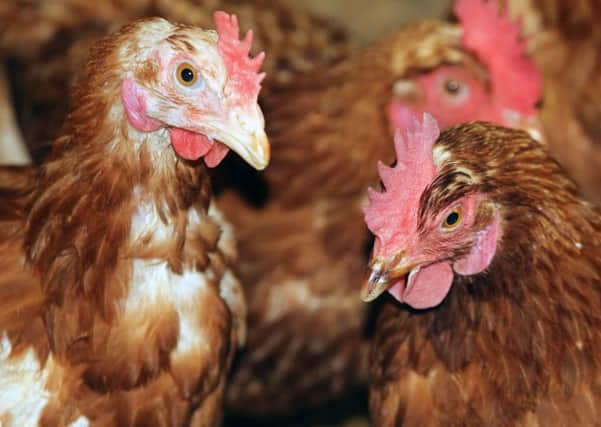Tense time for Sleaford area poultry farmer as labelling rules kick in for free range eggs due to bird flu restrictions


The demand for eggs in the UK peaks today (Tuesday) for pancake-making, but, since December 6, poultry farmers such as Mark and Heather Thorogood of Priory Free Range Foods of Ruskington have had to keep their roaming hens indoors to combat the spread of a virulent strain of avian flu.
Under EU rules, after 12 weeks of captivity, free range egg producers will have to re-package or label their eggs laid indoors from tomorrow onwards as “eggs laid by hens temporarily housed in barns for their welfare”. However it is likely that the premium prices for free range will not fall initially in an effort to support poultry farmers working to tight margins with rising costs of housing and feeding the hens indoors.
Advertisement
Hide AdAdvertisement
Hide AdThe Thorogoods started their family organic free range farm business in 2005. They have grown to produce 2,000 eggs a day serving shops, wholesalers and caterers all over the country.
Mr Thorogood said the situation was currently “very dynamic” for the whole industry, saying “There is no issue for consumers as far as eating eggs, but for production of eggs and meat it is very serious for us. The birds are very susceptible to this virus and we have to be very vigilant and careful about bio-security.”
As a business he said it has created an increased workload. He said: “The first few days were more difficult than we would have liked. We are an organic producer and very keen for the birds to go outside and range as much as possible. The birds are used to going out at certain times of day, but that difficulty has now passed and and they are acclimatised well.”
He said they are not in a high risk area of infection and after Wednesday, restrictions will begin to be relaxed, leaving it up to farmers to decide when to let their flocks venture outside again - under heightened bio-security precautions signed off by a vet. Farms in high risk areas must keep birds indoors until the end of April.
Advertisement
Hide AdAdvertisement
Hide AdAfter taking advice from various official sources, Mr Thorogood said: “We have already filled in our risk assessment and had it signed off by the vet, but I think we will wait at least another two weeks and if there are no more outbreaks it will give us confidence about taking the risk to let them out.”
They make sure ducks and geese flying over do not land on their farm, but Mr Thorogood said the infection can still linger in bird droppings for weeks. There was a reported outbreak in Northumberland in a supposed low risk area designated by Defra last week.
He said: “I understand the logic (of the designations) but birds know no boundaries and can fly great distances and we have to make a decision on what we see and feel.
“The welfare of our birds is of primary concern. If we got avian flu all the birds would have to be humanely destroyed. I don’t want to see people in white uniforms destroying my birds.”
Advertisement
Hide AdAdvertisement
Hide AdTo replace their two flocks and get them laying again would take six to eight months, but the farmer said: “As we sell all our eggs direct to customers our business would be finished because we would not be able to acquire the number of organic eggs we need to keep our customers happy.”
He added: “I desperately want my birds to be outside. I didn’t sign up to this business for my birds to be indoors, but we have not made a final decision yet what we are going to do.”
On the subject of labelling, Mr Thorogood said: “We still have eggs in stock which we can sell as free range. If we do not allow the birds out yet, new eggs will have to be labelled with a sticker.”
He hoped the premium prices will be maintained in the short term across the board to sustain the suppliers as industry margins are low with costs going up, but he imagined if the situation persists for two to three months then prices could fall.